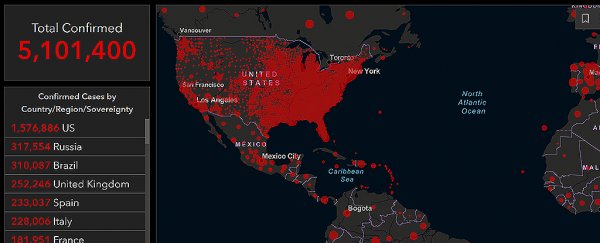The number of coronavirus cases reported worldwide has exceeded 5 million, around two and a half months after the World Health Organisation (WHO) declared the virus a pandemic.
Nearly a third – or 1,551,853 – of those cases are reported in the US, making it by far the hardest-hit country globally. More than 93,000 people in the US have died from the virus.
The numbers come from the Johns Hopkins University tracker, which has been tallying cases since early in the outbreak.
The figure is for the all-time number of cases. Of those 5 million, at least 1.9 million have recovered and 328,000 have died.
On Wednesday, around 100,000 new cases were added to the tracker globally, pushing the count over five million.
WHO Director-General Tedros Adhanom Ghebreyesus said that Wednesday's was the largest one-day increase so far, NBC reported.
It's around five weeks since the number of cases reported globally hit 2 million on April 15.
The true number of cases will inevitably be higher, as tests can only capture a proportion of total infections. Some nations and territories are also suspected of under-reporting.
The much-criticised US response to the outbreak stands in stark contrast to countries that quickly took drastic action to control the virus, such as South Korea.
President Trump has largely left it to individual states to decide what lockdown measures to take, which in many cases have been minimal.
Despite the rising numbers in the US overall, several states are beginning to lift restrictions, according to The Wall Street Journal.
Although the total global number of cases has continued to rise steadily since March, the pace is uneven. While outbreaks have declined considerably in Germany and Italy, cases in countries such as Brazil and Saudi Arabia are still reaching a peak.
Several countries – including China, where the virus first appeared – have reported a large drop in cases, but reimposed partial lockdowns after outbreaks began to reappear.
This article was originally published by Business Insider.
More from Business Insider:
